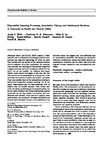Dissociable learning processes, associative theory, and testimonial reviews: A comment on Smith and Church (2018
| dc.contributor.author | Wills, Andy | |
| dc.contributor.author | Edmunds, C | |
| dc.contributor.author | Le Pelley, M | |
| dc.contributor.author | Milton, F | |
| dc.contributor.author | Newell, B | |
| dc.contributor.author | Dwyer, D | |
| dc.contributor.author | Shanks, D | |
| dc.date.accessioned | 2019-07-02T16:56:17Z | |
| dc.date.issued | 2019-08-13 | |
| dc.identifier.issn | 1069-9384 | |
| dc.identifier.issn | 1531-5320 | |
| dc.identifier.uri | http://hdl.handle.net/10026.1/14557 | |
| dc.description.abstract |
Smith and Church (Psychonomic Bulletin & Review, 25, 1565-1584 2018) present a "testimonial" review of dissociable learning processes in comparative and cognitive psychology, by which we mean they include only the portion of the available evidence that is consistent with their conclusions. For example, they conclude that learning the information-integration category-learning task with immediate feedback is implicit, but do not consider the evidence that people readily report explicit strategies in this task, nor that this task can be accommodated by accounts that make no distinction between implicit and explicit processes. They also consider some of the neuroscience relating to information-integration category learning, but do not report those aspects that are more consistent with an explicit than an implicit account. They further conclude that delay conditioning in humans is implicit, but do not report evidence that delay conditioning requires awareness; nor do they present the evidence that conditioned taste aversion, which should be explicit under their account, can be implicit. We agree with Smith and Church that it is helpful to have a clear definition of associative theory, but suggest that their definition may be unnecessarily restrictive. We propose an alternative definition of associative theory and briefly describe an experimental procedure that we think may better distinguish between associative and non-associative processes. | |
| dc.format.extent | 1988-1993 | |
| dc.format.medium | ||
| dc.language | en | |
| dc.language.iso | en | |
| dc.publisher | Springer Verlag | |
| dc.subject | Categorization | |
| dc.subject | Classical conditioning | |
| dc.subject | Connectionist models | |
| dc.subject | Metacognition | |
| dc.title | Dissociable learning processes, associative theory, and testimonial reviews: A comment on Smith and Church (2018 | |
| dc.type | journal-article | |
| dc.type | Journal Article | |
| dc.type | Comment | |
| plymouth.author-url | https://www.webofscience.com/api/gateway?GWVersion=2&SrcApp=PARTNER_APP&SrcAuth=LinksAMR&KeyUT=WOS:000497821600020&DestLinkType=FullRecord&DestApp=ALL_WOS&UsrCustomerID=11bb513d99f797142bcfeffcc58ea008 | |
| plymouth.issue | 6 | |
| plymouth.volume | 26 | |
| plymouth.publication-status | Published | |
| plymouth.journal | Psychonomic Bulletin and Review | |
| dc.identifier.doi | 10.3758/s13423-019-01644-3 | |
| plymouth.organisational-group | /Plymouth | |
| plymouth.organisational-group | /Plymouth/Admin Group - REF | |
| plymouth.organisational-group | /Plymouth/Admin Group - REF/REF Admin Group - FoH | |
| plymouth.organisational-group | /Plymouth/Faculty of Health | |
| plymouth.organisational-group | /Plymouth/Faculty of Health/School of Psychology | |
| plymouth.organisational-group | /Plymouth/REF 2021 Researchers by UoA | |
| plymouth.organisational-group | /Plymouth/REF 2021 Researchers by UoA/UoA04 Psychology, Psychiatry and Neuroscience | |
| plymouth.organisational-group | /Plymouth/Research Groups | |
| plymouth.organisational-group | /Plymouth/Research Groups/Institute of Health and Community | |
| plymouth.organisational-group | /Plymouth/Users by role | |
| plymouth.organisational-group | /Plymouth/Users by role/Academics | |
| dc.publisher.place | United States | |
| dcterms.dateAccepted | 2019-07-01 | |
| dc.rights.embargodate | 2020-8-12 | |
| dc.identifier.eissn | 1531-5320 | |
| dc.rights.embargoperiod | Not known | |
| rioxxterms.version | Accepted Manuscript | |
| rioxxterms.versionofrecord | 10.3758/s13423-019-01644-3 | |
| rioxxterms.licenseref.uri | http://www.rioxx.net/licenses/all-rights-reserved | |
| rioxxterms.licenseref.startdate | 2019-08-13 | |
| rioxxterms.type | Journal Article/Review |


